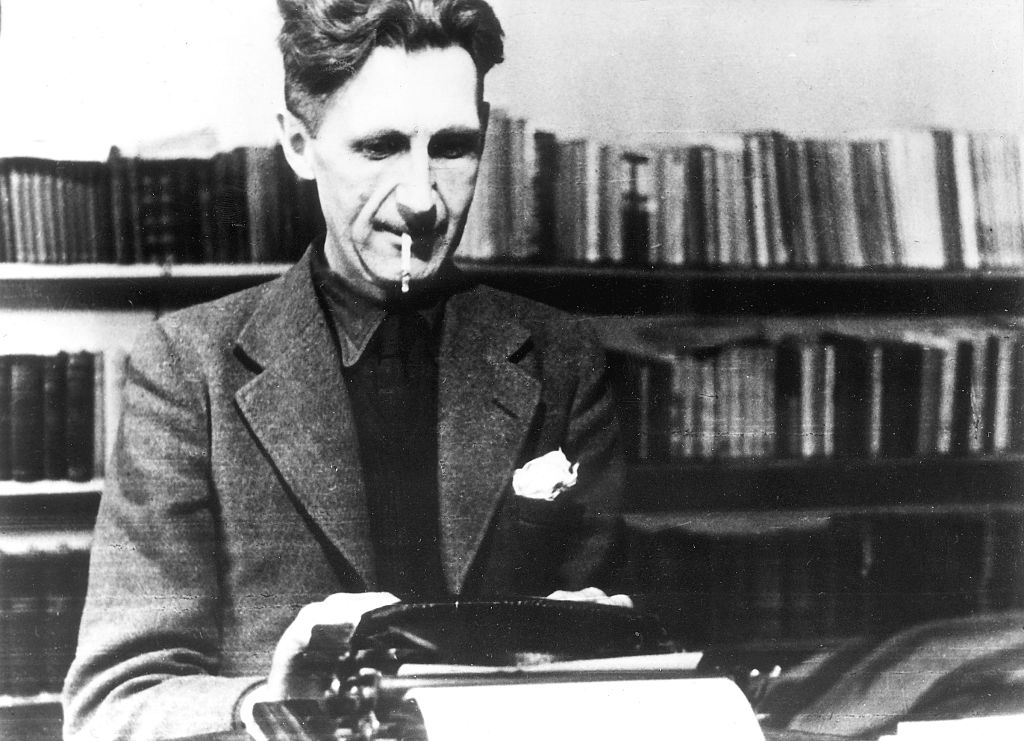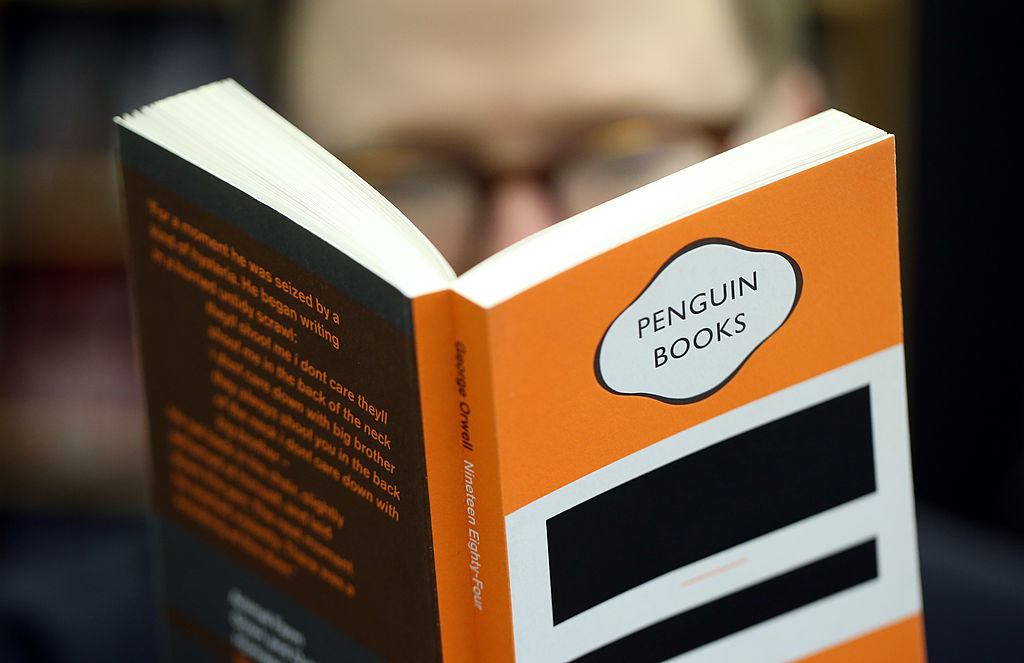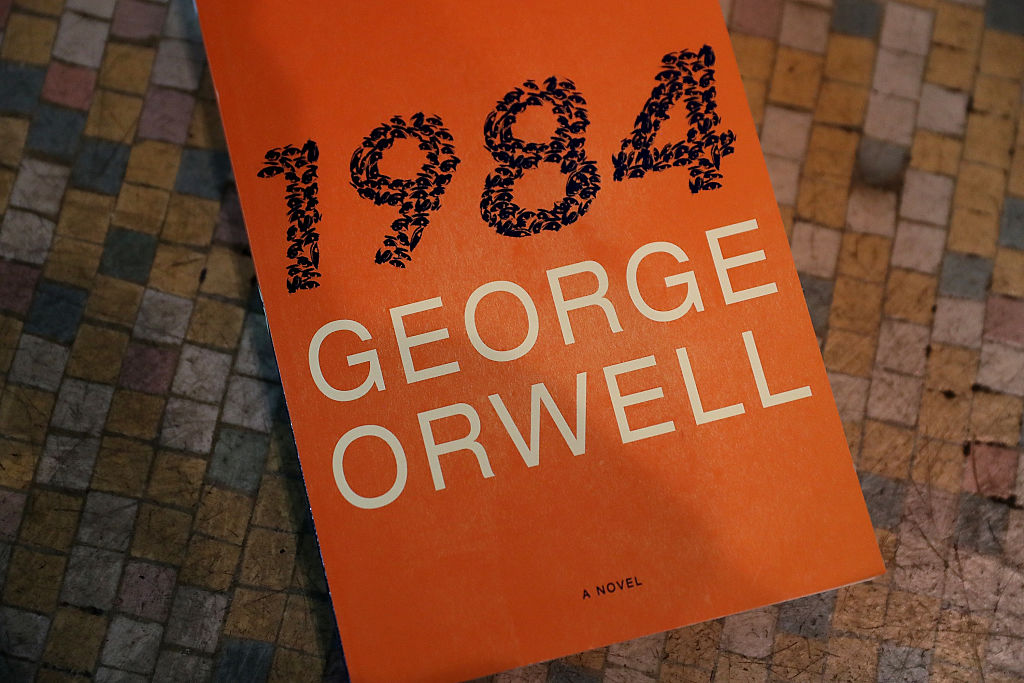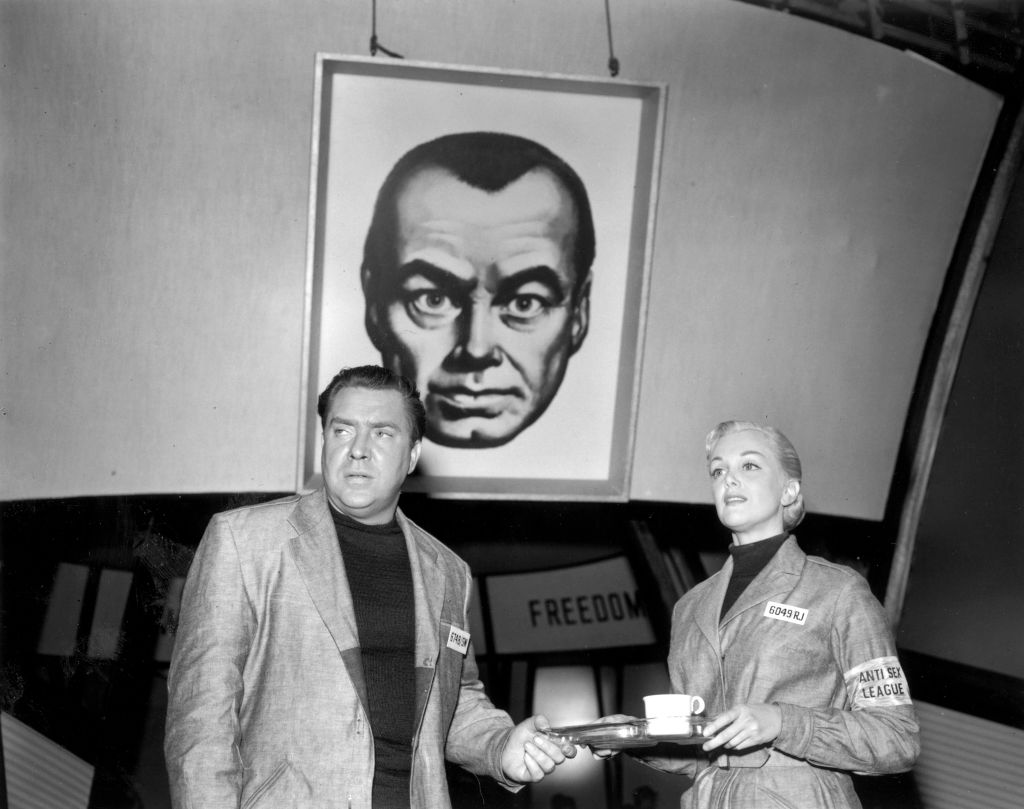“Reading “1984” closely is both sickening and cathartic because so much is instantly recognizable.”
@Bershidsky just finished the fifth Russian translation of Orwell’s famous novel. This is the book& #39;s Russian history https://bloom.bg/35BiP2A ">https://bloom.bg/35BiP2A&q...
@Bershidsky just finished the fifth Russian translation of Orwell’s famous novel. This is the book& #39;s Russian history https://bloom.bg/35BiP2A ">https://bloom.bg/35BiP2A&q...
He earned himself a “Trotskyite” label during the Spanish Civil War. Later, he made things worse by writing “Animal Farm” -- and a hard-hitting Ukrainian preface to it http://bloom.bg/35BiP2A ">https://bloom.bg/35BiP2A&q...
Yet, in 1958, the Soviet Communist Party ordered a translation and print run of "1984," strictly for high-ranking party officials who were supposed to know the enemy better than the masses http://bloom.bg/35BiP2A ">https://bloom.bg/35BiP2A&q...
That doesn’t mean other Soviet citizens couldn& #39;t read "1984." There were several ways to do it:
 https://abs.twimg.com/emoji/v2/... draggable="false" alt="📕" title="Closed book" aria-label="Emoji: Closed book">In English, if someone smuggled it past the border guards
https://abs.twimg.com/emoji/v2/... draggable="false" alt="📕" title="Closed book" aria-label="Emoji: Closed book">In English, if someone smuggled it past the border guards
 https://abs.twimg.com/emoji/v2/... draggable="false" alt="📗" title="Green book" aria-label="Emoji: Green book">The first Russian translation published overseas
https://abs.twimg.com/emoji/v2/... draggable="false" alt="📗" title="Green book" aria-label="Emoji: Green book">The first Russian translation published overseas
 https://abs.twimg.com/emoji/v2/... draggable="false" alt="📘" title="Blue book" aria-label="Emoji: Blue book">Unofficial bootleg copies, known as samizdat http://bloom.bg/35BiP2A ">https://bloom.bg/35BiP2A&q...
https://abs.twimg.com/emoji/v2/... draggable="false" alt="📘" title="Blue book" aria-label="Emoji: Blue book">Unofficial bootleg copies, known as samizdat http://bloom.bg/35BiP2A ">https://bloom.bg/35BiP2A&q...
Orwell’s novel did something important for its Soviet readers: It described the reality around them as something abnormal, and that made it tolerable.
Suddenly, it wasn’t their fault that they saw it all as both criminal and surreal http://bloom.bg/35BiP2A ">https://bloom.bg/35BiP2A&q...
Suddenly, it wasn’t their fault that they saw it all as both criminal and surreal http://bloom.bg/35BiP2A ">https://bloom.bg/35BiP2A&q...
The first two professional translations appeared in 1988 and 1989. Importantly, they rendered Orwell’s words into credible Russian, still used today:
Newspeak https://abs.twimg.com/emoji/v2/... draggable="false" alt="➡️" title="Rightwards arrow" aria-label="Emoji: Rightwards arrow">novoyaz
https://abs.twimg.com/emoji/v2/... draggable="false" alt="➡️" title="Rightwards arrow" aria-label="Emoji: Rightwards arrow">novoyaz
Thoughtcrime https://abs.twimg.com/emoji/v2/... draggable="false" alt="➡️" title="Rightwards arrow" aria-label="Emoji: Rightwards arrow">mysleprestupleniye
https://abs.twimg.com/emoji/v2/... draggable="false" alt="➡️" title="Rightwards arrow" aria-label="Emoji: Rightwards arrow">mysleprestupleniye
Telescreen https://abs.twimg.com/emoji/v2/... draggable="false" alt="➡️" title="Rightwards arrow" aria-label="Emoji: Rightwards arrow">telekran
https://abs.twimg.com/emoji/v2/... draggable="false" alt="➡️" title="Rightwards arrow" aria-label="Emoji: Rightwards arrow">telekran
Big Brother https://abs.twimg.com/emoji/v2/... draggable="false" alt="➡️" title="Rightwards arrow" aria-label="Emoji: Rightwards arrow">Bolshoi Brat http://bloom.bg/35BiP2A ">https://bloom.bg/35BiP2A&q...
https://abs.twimg.com/emoji/v2/... draggable="false" alt="➡️" title="Rightwards arrow" aria-label="Emoji: Rightwards arrow">Bolshoi Brat http://bloom.bg/35BiP2A ">https://bloom.bg/35BiP2A&q...
Newspeak
Thoughtcrime
Telescreen
Big Brother
. @Bershidsky’s new translation takes a different approach to the linguistic annex.
 https://abs.twimg.com/emoji/v2/... draggable="false" alt="💭" title="Thought balloon" aria-label="Emoji: Thought balloon">Thoughtcrime, for example becomes “krivodum”, literally meaning crooked thinking, rather than the cumbersome “mysleprestupleniye” http://bloom.bg/35BiP2A ">https://bloom.bg/35BiP2A&q...
https://abs.twimg.com/emoji/v2/... draggable="false" alt="💭" title="Thought balloon" aria-label="Emoji: Thought balloon">Thoughtcrime, for example becomes “krivodum”, literally meaning crooked thinking, rather than the cumbersome “mysleprestupleniye” http://bloom.bg/35BiP2A ">https://bloom.bg/35BiP2A&q...
His most controversial choice was translating Ingsoc, the name of the Oceanian ideology.
Previous Russian translators decided on “angsots,” using the first syllables of England and socialism. @Bershidksy chose “Anglism,” which has a more jingoistic feel http://bloom.bg/35BiP2A ">https://bloom.bg/35BiP2A&q...
Previous Russian translators decided on “angsots,” using the first syllables of England and socialism. @Bershidksy chose “Anglism,” which has a more jingoistic feel http://bloom.bg/35BiP2A ">https://bloom.bg/35BiP2A&q...
So why is 1984 suddenly relevant again?
With the shrinking of basic freedoms, the rewriting of history and erosion of language and culture – have Orwell’s prophecies been fulfilled? @Bershidsky says no http://bloom.bg/35BiP2A ">https://bloom.bg/35BiP2A&q...
With the shrinking of basic freedoms, the rewriting of history and erosion of language and culture – have Orwell’s prophecies been fulfilled? @Bershidsky says no http://bloom.bg/35BiP2A ">https://bloom.bg/35BiP2A&q...
Regimes, like Russia, try bits of the Oceanian recipe:
 https://abs.twimg.com/emoji/v2/... draggable="false" alt="📡" title="Satellite antenna" aria-label="Emoji: Satellite antenna">Search for external enemies
https://abs.twimg.com/emoji/v2/... draggable="false" alt="📡" title="Satellite antenna" aria-label="Emoji: Satellite antenna">Search for external enemies
 https://abs.twimg.com/emoji/v2/... draggable="false" alt="⚠️" title="Warning sign" aria-label="Emoji: Warning sign">Demand blind loyalty
https://abs.twimg.com/emoji/v2/... draggable="false" alt="⚠️" title="Warning sign" aria-label="Emoji: Warning sign">Demand blind loyalty
 https://abs.twimg.com/emoji/v2/... draggable="false" alt="👁" title="Eye" aria-label="Emoji: Eye">Increasingly sophisticated surveillance and propaganda methods
https://abs.twimg.com/emoji/v2/... draggable="false" alt="👁" title="Eye" aria-label="Emoji: Eye">Increasingly sophisticated surveillance and propaganda methods
But they continue to be thwarted by those who refuse to think as they’re told http://bloom.bg/35BiP2A ">https://bloom.bg/35BiP2A&q...
But they continue to be thwarted by those who refuse to think as they’re told http://bloom.bg/35BiP2A ">https://bloom.bg/35BiP2A&q...
In 1984, Winston Smith ends up the loser, but thanks to the newspeak annex, we know that the Ingsoc system ultimately lost.
Winston’s rebellion wasn’t entirely wasted http://bloom.bg/35BiP2A ">https://bloom.bg/35BiP2A&q...
Winston’s rebellion wasn’t entirely wasted http://bloom.bg/35BiP2A ">https://bloom.bg/35BiP2A&q...

 Read on Twitter
Read on Twitter George Orwell’s work was shunned in Stalin’s Soviet Union.He earned himself a “Trotskyite” label during the Spanish Civil War. Later, he made things worse by writing “Animal Farm” -- and a hard-hitting Ukrainian preface to it https://bloom.bg/35BiP2A&q..." title="https://abs.twimg.com/emoji/v2/... draggable="false" alt="🚫" title="No entry sign" aria-label="Emoji: No entry sign">George Orwell’s work was shunned in Stalin’s Soviet Union.He earned himself a “Trotskyite” label during the Spanish Civil War. Later, he made things worse by writing “Animal Farm” -- and a hard-hitting Ukrainian preface to it https://bloom.bg/35BiP2A&q..." class="img-responsive" style="max-width:100%;"/>
George Orwell’s work was shunned in Stalin’s Soviet Union.He earned himself a “Trotskyite” label during the Spanish Civil War. Later, he made things worse by writing “Animal Farm” -- and a hard-hitting Ukrainian preface to it https://bloom.bg/35BiP2A&q..." title="https://abs.twimg.com/emoji/v2/... draggable="false" alt="🚫" title="No entry sign" aria-label="Emoji: No entry sign">George Orwell’s work was shunned in Stalin’s Soviet Union.He earned himself a “Trotskyite” label during the Spanish Civil War. Later, he made things worse by writing “Animal Farm” -- and a hard-hitting Ukrainian preface to it https://bloom.bg/35BiP2A&q..." class="img-responsive" style="max-width:100%;"/>
 “1984” couldn’t be published in the Soviet Union.Yet, in 1958, the Soviet Communist Party ordered a translation and print run of "1984," strictly for high-ranking party officials who were supposed to know the enemy better than the masses https://bloom.bg/35BiP2A&q..." title="https://abs.twimg.com/emoji/v2/... draggable="false" alt="📖" title="Open book" aria-label="Emoji: Open book">“1984” couldn’t be published in the Soviet Union.Yet, in 1958, the Soviet Communist Party ordered a translation and print run of "1984," strictly for high-ranking party officials who were supposed to know the enemy better than the masses https://bloom.bg/35BiP2A&q..." class="img-responsive" style="max-width:100%;"/>
“1984” couldn’t be published in the Soviet Union.Yet, in 1958, the Soviet Communist Party ordered a translation and print run of "1984," strictly for high-ranking party officials who were supposed to know the enemy better than the masses https://bloom.bg/35BiP2A&q..." title="https://abs.twimg.com/emoji/v2/... draggable="false" alt="📖" title="Open book" aria-label="Emoji: Open book">“1984” couldn’t be published in the Soviet Union.Yet, in 1958, the Soviet Communist Party ordered a translation and print run of "1984," strictly for high-ranking party officials who were supposed to know the enemy better than the masses https://bloom.bg/35BiP2A&q..." class="img-responsive" style="max-width:100%;"/>
 In English, if someone smuggled it past the border guardshttps://abs.twimg.com/emoji/v2/... draggable="false" alt="📗" title="Green book" aria-label="Emoji: Green book">The first Russian translation published overseashttps://abs.twimg.com/emoji/v2/... draggable="false" alt="📘" title="Blue book" aria-label="Emoji: Blue book">Unofficial bootleg copies, known as samizdat https://bloom.bg/35BiP2A&q..." title="That doesn’t mean other Soviet citizens couldn& #39;t read "1984." There were several ways to do it:https://abs.twimg.com/emoji/v2/... draggable="false" alt="📕" title="Closed book" aria-label="Emoji: Closed book">In English, if someone smuggled it past the border guardshttps://abs.twimg.com/emoji/v2/... draggable="false" alt="📗" title="Green book" aria-label="Emoji: Green book">The first Russian translation published overseashttps://abs.twimg.com/emoji/v2/... draggable="false" alt="📘" title="Blue book" aria-label="Emoji: Blue book">Unofficial bootleg copies, known as samizdat https://bloom.bg/35BiP2A&q..." class="img-responsive" style="max-width:100%;"/>
In English, if someone smuggled it past the border guardshttps://abs.twimg.com/emoji/v2/... draggable="false" alt="📗" title="Green book" aria-label="Emoji: Green book">The first Russian translation published overseashttps://abs.twimg.com/emoji/v2/... draggable="false" alt="📘" title="Blue book" aria-label="Emoji: Blue book">Unofficial bootleg copies, known as samizdat https://bloom.bg/35BiP2A&q..." title="That doesn’t mean other Soviet citizens couldn& #39;t read "1984." There were several ways to do it:https://abs.twimg.com/emoji/v2/... draggable="false" alt="📕" title="Closed book" aria-label="Emoji: Closed book">In English, if someone smuggled it past the border guardshttps://abs.twimg.com/emoji/v2/... draggable="false" alt="📗" title="Green book" aria-label="Emoji: Green book">The first Russian translation published overseashttps://abs.twimg.com/emoji/v2/... draggable="false" alt="📘" title="Blue book" aria-label="Emoji: Blue book">Unofficial bootleg copies, known as samizdat https://bloom.bg/35BiP2A&q..." class="img-responsive" style="max-width:100%;"/>

 novoyazThoughtcrimehttps://abs.twimg.com/emoji/v2/... draggable="false" alt="➡️" title="Rightwards arrow" aria-label="Emoji: Rightwards arrow">mysleprestupleniyeTelescreenhttps://abs.twimg.com/emoji/v2/... draggable="false" alt="➡️" title="Rightwards arrow" aria-label="Emoji: Rightwards arrow">telekranBig Brotherhttps://abs.twimg.com/emoji/v2/... draggable="false" alt="➡️" title="Rightwards arrow" aria-label="Emoji: Rightwards arrow">Bolshoi Brat https://bloom.bg/35BiP2A&q..." title="The first two professional translations appeared in 1988 and 1989. Importantly, they rendered Orwell’s words into credible Russian, still used today:Newspeakhttps://abs.twimg.com/emoji/v2/... draggable="false" alt="➡️" title="Rightwards arrow" aria-label="Emoji: Rightwards arrow">novoyazThoughtcrimehttps://abs.twimg.com/emoji/v2/... draggable="false" alt="➡️" title="Rightwards arrow" aria-label="Emoji: Rightwards arrow">mysleprestupleniyeTelescreenhttps://abs.twimg.com/emoji/v2/... draggable="false" alt="➡️" title="Rightwards arrow" aria-label="Emoji: Rightwards arrow">telekranBig Brotherhttps://abs.twimg.com/emoji/v2/... draggable="false" alt="➡️" title="Rightwards arrow" aria-label="Emoji: Rightwards arrow">Bolshoi Brat https://bloom.bg/35BiP2A&q..." class="img-responsive" style="max-width:100%;"/>
novoyazThoughtcrimehttps://abs.twimg.com/emoji/v2/... draggable="false" alt="➡️" title="Rightwards arrow" aria-label="Emoji: Rightwards arrow">mysleprestupleniyeTelescreenhttps://abs.twimg.com/emoji/v2/... draggable="false" alt="➡️" title="Rightwards arrow" aria-label="Emoji: Rightwards arrow">telekranBig Brotherhttps://abs.twimg.com/emoji/v2/... draggable="false" alt="➡️" title="Rightwards arrow" aria-label="Emoji: Rightwards arrow">Bolshoi Brat https://bloom.bg/35BiP2A&q..." title="The first two professional translations appeared in 1988 and 1989. Importantly, they rendered Orwell’s words into credible Russian, still used today:Newspeakhttps://abs.twimg.com/emoji/v2/... draggable="false" alt="➡️" title="Rightwards arrow" aria-label="Emoji: Rightwards arrow">novoyazThoughtcrimehttps://abs.twimg.com/emoji/v2/... draggable="false" alt="➡️" title="Rightwards arrow" aria-label="Emoji: Rightwards arrow">mysleprestupleniyeTelescreenhttps://abs.twimg.com/emoji/v2/... draggable="false" alt="➡️" title="Rightwards arrow" aria-label="Emoji: Rightwards arrow">telekranBig Brotherhttps://abs.twimg.com/emoji/v2/... draggable="false" alt="➡️" title="Rightwards arrow" aria-label="Emoji: Rightwards arrow">Bolshoi Brat https://bloom.bg/35BiP2A&q..." class="img-responsive" style="max-width:100%;"/>
 Thoughtcrime, for example becomes “krivodum”, literally meaning crooked thinking, rather than the cumbersome “mysleprestupleniye” https://bloom.bg/35BiP2A&q..." title=". @Bershidsky’s new translation takes a different approach to the linguistic annex.https://abs.twimg.com/emoji/v2/... draggable="false" alt="💭" title="Thought balloon" aria-label="Emoji: Thought balloon">Thoughtcrime, for example becomes “krivodum”, literally meaning crooked thinking, rather than the cumbersome “mysleprestupleniye” https://bloom.bg/35BiP2A&q..." class="img-responsive" style="max-width:100%;"/>
Thoughtcrime, for example becomes “krivodum”, literally meaning crooked thinking, rather than the cumbersome “mysleprestupleniye” https://bloom.bg/35BiP2A&q..." title=". @Bershidsky’s new translation takes a different approach to the linguistic annex.https://abs.twimg.com/emoji/v2/... draggable="false" alt="💭" title="Thought balloon" aria-label="Emoji: Thought balloon">Thoughtcrime, for example becomes “krivodum”, literally meaning crooked thinking, rather than the cumbersome “mysleprestupleniye” https://bloom.bg/35BiP2A&q..." class="img-responsive" style="max-width:100%;"/>


 Search for external enemieshttps://abs.twimg.com/emoji/v2/... draggable="false" alt="⚠️" title="Warning sign" aria-label="Emoji: Warning sign">Demand blind loyaltyhttps://abs.twimg.com/emoji/v2/... draggable="false" alt="👁" title="Eye" aria-label="Emoji: Eye">Increasingly sophisticated surveillance and propaganda methodsBut they continue to be thwarted by those who refuse to think as they’re told https://bloom.bg/35BiP2A&q..." title="Regimes, like Russia, try bits of the Oceanian recipe:https://abs.twimg.com/emoji/v2/... draggable="false" alt="📡" title="Satellite antenna" aria-label="Emoji: Satellite antenna">Search for external enemieshttps://abs.twimg.com/emoji/v2/... draggable="false" alt="⚠️" title="Warning sign" aria-label="Emoji: Warning sign">Demand blind loyaltyhttps://abs.twimg.com/emoji/v2/... draggable="false" alt="👁" title="Eye" aria-label="Emoji: Eye">Increasingly sophisticated surveillance and propaganda methodsBut they continue to be thwarted by those who refuse to think as they’re told https://bloom.bg/35BiP2A&q..." class="img-responsive" style="max-width:100%;"/>
Search for external enemieshttps://abs.twimg.com/emoji/v2/... draggable="false" alt="⚠️" title="Warning sign" aria-label="Emoji: Warning sign">Demand blind loyaltyhttps://abs.twimg.com/emoji/v2/... draggable="false" alt="👁" title="Eye" aria-label="Emoji: Eye">Increasingly sophisticated surveillance and propaganda methodsBut they continue to be thwarted by those who refuse to think as they’re told https://bloom.bg/35BiP2A&q..." title="Regimes, like Russia, try bits of the Oceanian recipe:https://abs.twimg.com/emoji/v2/... draggable="false" alt="📡" title="Satellite antenna" aria-label="Emoji: Satellite antenna">Search for external enemieshttps://abs.twimg.com/emoji/v2/... draggable="false" alt="⚠️" title="Warning sign" aria-label="Emoji: Warning sign">Demand blind loyaltyhttps://abs.twimg.com/emoji/v2/... draggable="false" alt="👁" title="Eye" aria-label="Emoji: Eye">Increasingly sophisticated surveillance and propaganda methodsBut they continue to be thwarted by those who refuse to think as they’re told https://bloom.bg/35BiP2A&q..." class="img-responsive" style="max-width:100%;"/>



